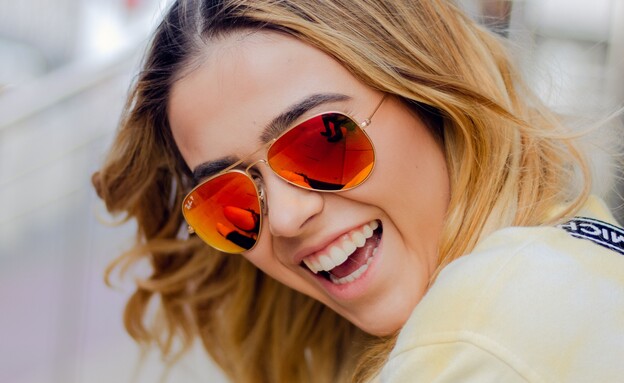What does the color of the lens mean?
Precisely due to the fact that sunglasses have become a fashionable item, many tend to forget their importance in maintaining eye health. “While in recent years fashionable sunglasses with blue, pink or green lenses have appeared, these do not necessarily protect the health of the eye any less well than the dark glasses,” Sabag explains, “this is because it is not the darkness of the lens that protects the eye. The potential for the highest damage is because dark lenses cause the pupils of the eyes to expand and absorb more harmful radiation,” concludes Sabeg.
In order to be sure that the sunglasses you have purchased actually protect the eyes and not just decorate the face, it is important to make sure that there is full protection (at a rate of 99-100%) against UVA and UVB rays with a preference for large glasses that also protect the eyes from the sides. When staying in the sun – it is recommended to strengthen the protection of the glasses also with a wide-brimmed hat that provides an additional layer of protection for the eyes and facial skin.
Cold and dry: how to keep the eye moist even under the air conditioner
The Israeli summer brings with it the constant use of air conditioners and fans, but it is important to know that their use often leads to drying and irritation of the eyes. “If possible, it is recommended to turn off the fan and the air conditioner and allow the eyes to rest at least in the evening or at night. If the heat is extreme and there is no way to leave the cooling on, you can direct the wind away from the face area by moving the shutters of the air conditioner or the fan head – something that is especially important when driving In a car where the air conditioner is at a tiny distance from the eyes.” Beyond that, Sabeg suggests using external aids: “You can raise the level of humidity in the air with a vapor diffuser or use wetting drops.”
Sea or pool: which is better for eye health?
Between the air conditioners and the chlorine in the pools, the summer pastime that is considered the safest for eye health is bathing in the sea. Although sea water can burn in contact with the eyes, it is actually considered one of the most useful natural substances in the world of medicine and in particular in regards to eye care. The salt water encourages the production of tears, which in turn help to clean the eye and return it to its normal state. If the pain really bothers you, you can wash your eyes with fresh water, but when it comes to sea water – you don’t have to worry about redness of the eyes.
Bitter jellyfish sting: it turns out that the eyes can also be damaged
There are periods when he looks white from too many jellyfish. This usually happens at the height of summer, in the July-August region when the temperatures rise and so does our suffering from the extreme heat. Besides painful bites on our skin on the limbs, abdomen or back, there is also a risk of bites and burns in the eye area. In order to treat eye pain caused by the sting of jellyfish, it is recommended to wash the eyes with sea water and only then with fresh water.
How can chlorine redness be avoided?
Not everyone likes to bathe in the sea. There are those who shy away from sand and waves – certainly if it is the time of the oppressive jellyfish. If you are more of a pool type than a sea type, you probably know the sensation of chlorine water when it comes into contact with the eyes: something that produces discomfort and even pain, burning, itching and redness. The surest way to avoid these pains is to wear swimming goggles. If these are not present, the eyes should be washed with clean water immediately after bathing, and if the symptoms do not subside – it is recommended to continue treatment with a salt solution (saline).
Sea and pool with contact lenses: when yes and when absolutely no?
For years, swimming in the sea and in the pool with lenses was considered taboo due to the fear of contaminating the lens from the bacteria in the water in a way that could lead to eye infections and other infections. At the same time, soft, disposable contact lenses that have come on the market in recent years have brought real news to lens components.
“It is important to make sure to put them on while swimming together with sealed binoculars and discard the lenses after leaving the water and change to new lenses. One of the more advanced solutions in the world of contact lenses is the use of hard contact lenses that correct vision during the night, so that during the day there is no need to wear glasses or contact lenses For the swimmers among you, this can be a real opportunity.” Sabeg summarizes.
Lumps and rash (also allergic)
Besides the heat, the jellyfish, the sunburns and the sweat – summer also brings a lot of allergies. According to Sabeg, there are two main types of ‘summer allergies’ that affect the eyes: most of the allergies that come in the summer are usually caused by rashes and grass and many times can cause itching, tearing, inflammation and burning in the eyes.” In order to avoid this, it is recommended to protect the eyes especially on days with A lot of wind with sunglasses and if the allergy has already arrived, it is recommended to stay away from the source of the allergy and if necessary and according to the recommendation of your ophthalmologist to take antihistamines.
